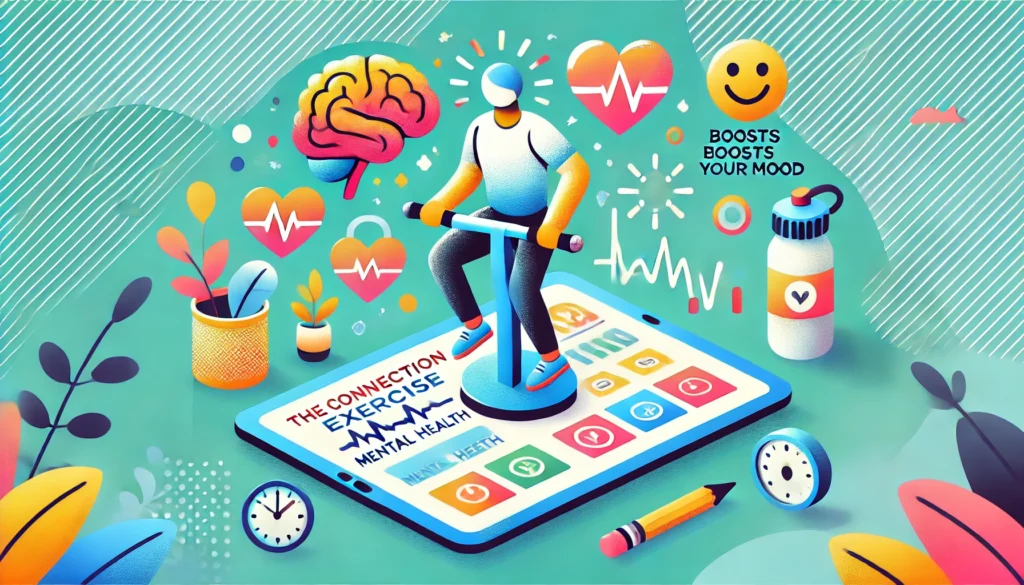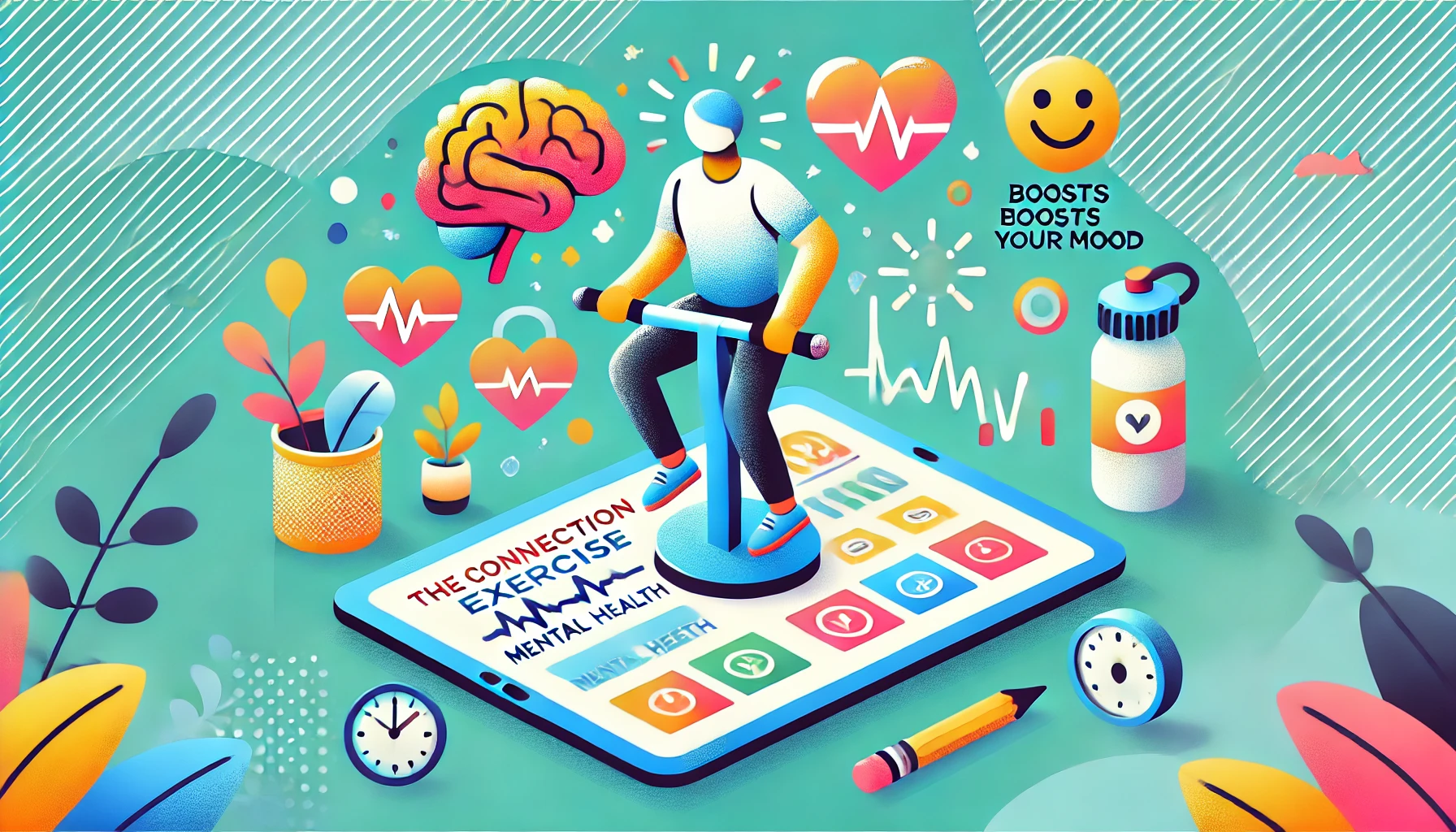We all know that exercise is beneficial for physical health, but its impact on mental health is equally significant. Whether you’re dealing with stress, anxiety, depression, or just want to improve your overall mood, exercise can play a crucial role. This article delves into the powerful connection between exercise and mental health, explaining how physical activity boosts your mood and enhances your overall well-being.

1. The Science Behind Exercise and Mood Improvement
Exercise affects the brain in multiple ways, many of which have a direct impact on mood regulation. When you engage in physical activity, your brain releases endorphins—chemicals often referred to as “feel-good” hormones. These endorphins help reduce pain and boost feelings of happiness and relaxation.
Additionally, regular exercise increases the production of neurotransmitters like serotonin, dopamine, and norepinephrine, which help to regulate mood, stress, and anxiety. Over time, the cumulative effects of these brain chemicals lead to better mental resilience and emotional well-being.
2. Reducing Symptoms of Anxiety and Depression
Exercise has been found to significantly reduce symptoms of both anxiety and depression. Studies have shown that regular physical activity can have a similar effect to antidepressant medication for some individuals. The act of moving your body, whether it’s running, cycling, or weightlifting, can help take your mind off negative thoughts and focus your energy on something productive.
Key Benefits for Depression and Anxiety:
- Increases feelings of calm and relaxation
- Provides a healthy outlet for releasing pent-up tension
- Improves self-esteem and confidence through physical improvements
- Promotes better sleep, which is crucial for mood regulation
Best Exercises for Anxiety and Depression:
- Aerobic activities like running, swimming, or cycling
- Strength training to boost confidence and physical strength
- Yoga and Pilates for mindfulness and stress relief
3. Exercise as a Natural Stress Reliever
Stress is an inevitable part of life, but exercise offers a natural way to manage it. Physical activity reduces the levels of stress hormones such as cortisol, which helps your body recover faster from stressful situations. Additionally, exercise stimulates the production of endorphins, further reducing stress and promoting a sense of well-being.
By regularly incorporating exercise into your routine, you train your body to handle stress more efficiently, leading to improved emotional stability and mood regulation.
Stress-Relieving Exercises:
- Running or walking outdoors, which combines the benefits of physical activity with fresh air and nature exposure
- Swimming, which offers a full-body workout while promoting relaxation
- Boxing or kickboxing, which can provide an outlet for frustration and anger
4. Enhancing Cognitive Function and Mental Clarity
Exercise doesn’t just make you feel good in the moment; it can also improve your cognitive abilities and mental clarity in the long term. Physical activity boosts blood flow to the brain, enhancing brain function and supporting the growth of new neurons. This means that regular exercise can help improve memory, concentration, and decision-making skills.
For people facing cognitive challenges due to stress, anxiety, or aging, exercise offers a way to sharpen mental acuity while reducing the emotional burden of mental fog.
Best Exercises for Mental Clarity:
- High-intensity interval training (HIIT) to boost brain function
- Dancing, which involves both physical movement and mental coordination
- Group sports like basketball or soccer that require quick thinking and teamwork
5. Improving Self-Esteem and Body Image
Engaging in regular exercise helps improve self-esteem by enhancing your physical appearance, strength, and endurance. Over time, these physical improvements translate into a better self-image and greater confidence. For those who struggle with body image issues, working out can provide a positive sense of control and accomplishment, shifting focus from appearance to capability.
Additionally, the act of setting and achieving fitness goals—whether they are related to weight, strength, or endurance—can offer a significant boost to your self-worth.
Exercises for Self-Esteem Boost:
- Strength training to build physical power and confidence
- Cardiovascular exercises like cycling or running to improve stamina
- Group fitness classes to enjoy the motivational energy of others
6. Promoting Better Sleep, Which Improves Mood
Sleep and mental health are closely linked, and exercise can play a vital role in improving the quality and duration of your sleep. Regular physical activity helps regulate your circadian rhythm, making it easier to fall asleep and wake up at consistent times. It also reduces insomnia and allows you to get deeper, more restful sleep.
Since poor sleep is linked to mood disorders like anxiety and depression, regular exercise can act as a natural sleep aid, improving both your physical and emotional well-being.
Best Exercises for Sleep Improvement:
- Low-intensity activities like yoga or Pilates before bed to relax the body
- Cardiovascular exercises like jogging or swimming during the day to reduce stress
- Strength training earlier in the day to tire your muscles and promote restful sleep
7. Social Benefits of Group Exercise
Exercising with others can add a significant social element to your workout, which is another great way to boost mood and mental health. Whether you join a local running club, attend a group fitness class, or play a team sport, socializing while working out helps combat feelings of loneliness and isolation. The sense of community and support from others can improve both mental and emotional health.
Benefits of Social Workouts:
- Increased accountability and motivation
- Emotional support and encouragement from peers
- Shared experiences that foster a sense of belonging
Related: The Best Fitness Apps for Tracking Progress and Staying Motivated
Conclusion
The connection between exercise and mental health is undeniable. By incorporating regular physical activity into your routine, you not only improve your physical health but also support your mental well-being. Whether you’re managing stress, anxiety, depression, or simply looking to enhance your mood, exercise offers a natural and effective solution.
From aerobic workouts to yoga and group fitness classes, there’s a form of exercise that can help everyone achieve a healthier, happier mind. Start today and experience the positive effects that exercise can have on your mood and overall mental health.

